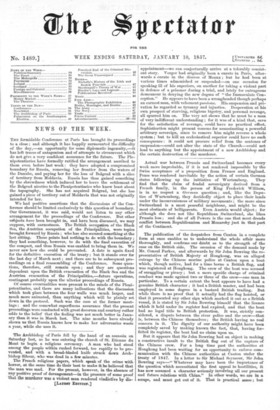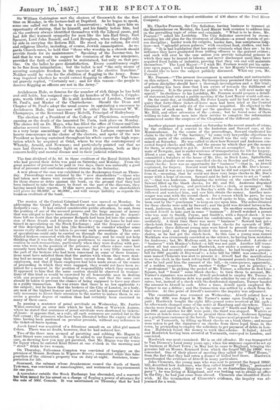The publication of the despatches from Canton in a complete
form at once enables us to understand the whole affair more thoroughly, and confirms our doubt as to the strength of the case on the British side. The occasion of the demand made by Mr. Consul Parkes, and afterwards by Sir John Bowring the representative of British Majesty at Hongkong, was an alleged outrage by the Chinese marine police at Canton upon a boat which, though native, had for a time borne a British flag, and. was registered at Hongkong. The crow of the boat was accused of smuggling or piracy ; but a more specific charge of criminal conduct was made against two or three of the crew—one man in particular. To a certain extent the boat appears to have had a genuine British character ; it had a British master, and had been employed in some degree in a bastard British trading. But while there is no proof that it actually had the flag hoisted, or that it presented any other sign which marked it out as a British vessel, it is stated by Sir John Bowring himself that the licence which it held under its register had expired, and that the boat had no legal title to British protection. It was, strictly considered, a dispute between the river police and the crew—that is, between the Chinese themselves ; the British having no real concern in it. The dignity of our authority might have been completely saved by making known the fact, that, having forfeited its register, the boat had no claim upon us.
But it appears that Sir John Bowling had an object in making a constructive insult to the British flag out of the capture of the Chinese crew. For a long time past the authorities at Hongkong had been waiting for an opportunity to enforce communication with the Chinese authorities at Canton under the treaty of 1847. In a letter to Sir Michael Seymour, Sir John Bowring says—" Whatever may have been the importance of the question which necessitated the first appeal to hostilities, it has now assumed a character seriously involving all our present and future relations with China." In other words, we are in a scrape, and must get out of it. That is practical sense; but Sir William Codrington met the electors of Greenwich for the first time on Monday, in the lecture-hall at Deptford. As he began to speak, some one called out that he was a Conservative which gave him an opportunity of stating, that he himself, and his family before him, had on the contrary always identified themselves with the Liberal cause, and had felt the] warmest sympathy for men like the late Earl Grey, Earl Spencer, Lord John Russell, and Lord Brougham, when they fought side by side in carrying the Reform Bill. He stood up for reform, for civil and religious liberty, including, of course, Jewish emancipation. As regards Church-rates, he held that "those who worship in a church ahonld provide funds for its maintenance." Speaking of the Income-tax, he said that he was ready to support the remission of the war ninepence, provided the faith of the country be maintained, but only on that proviso. On the ballot lie gave dissatisfaction. Every constituency ought to be free from intimidation; but the ballot is not "the only means of securing complete freedom in the exercise of the elective franchise." Neither could he vote for the abolition of flogging in the Army. Some wag inquired whether he would extend flogging to officers? The General gravely replied, "Certainly not ; and for this reason—the people to deserve flogging as officers are not in the Army."





























 Previous page
Previous page